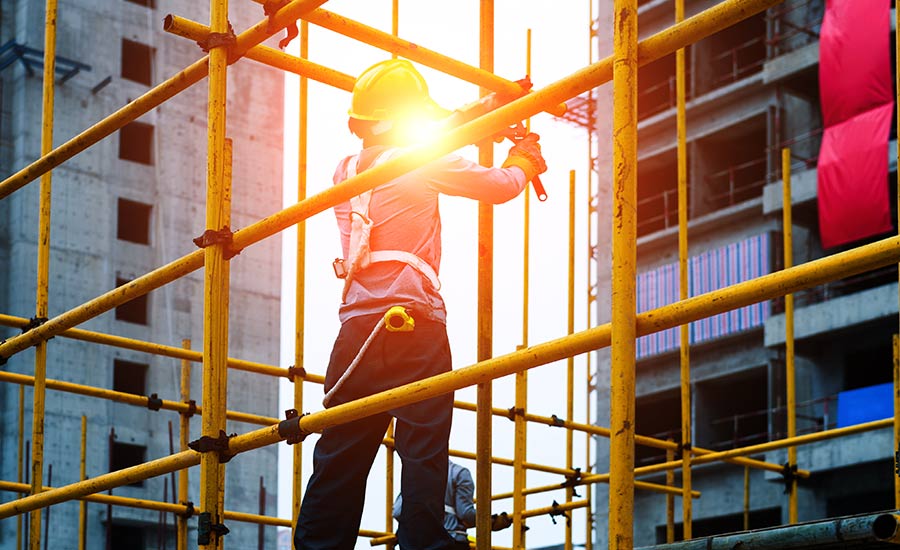

Whether you’re looking for tips on how to prevent a construction accident, or you were recently injured in an accident, this guide from our personal injury attorneys at Spar & Bernstein can help.
We’ll explain the most common causes of construction accidents, the parties you can hold responsible and the damages you can pursue if you sustained injuries.
Common Causes Of Construction Accidents
From equipment malfunction to electrical hazards, the most common causes of construction accidents include:
Scaffold & Ladder Malfunctions
A frequent cause of construction accidents, scaffold and ladder malfunction often leads to structural failure and collapse, resulting in severe injuries and even fatalities.
Scaffold and ladder malfunction can occur due to multiple reasons, including:
- Improper assembly of scaffold components, such as missing bolts or braces
- Overloading, whether due to employees or excessive materials
- Failure to detect signs of wear and damage during inspections
- Placement on uneven or unstable surfaces
Defective Equipment
From malfunctioning power tools to faulty heavy machinery, defective equipment can compromise reliability and pose imminent risks to the safety of both workers and bystanders.
Defective equipment can include:
- Cranes, excavators or bulldozers with structural weaknesses, malfunctioning controls or faulty hydraulic systems
- Forklifts and trucks with manufacturing errors in braking systems and steering mechanisms
- Hammers, wrenches or screwdrivers with defects in materials or design
- Defectively manufactured construction materials, such as faulty concrete, which can compromise the structural integrity of a building
Defective Equipment
From malfunctioning power tools to faulty heavy machinery, defective equipment can compromise reliability and pose imminent risks to the safety of both workers and bystanders.
Defective equipment can include:
- Cranes, excavators or bulldozers with structural weaknesses, malfunctioning controls or faulty hydraulic systems
- Forklifts and trucks with manufacturing errors in braking systems and steering mechanisms
- Hammers, wrenches or screwdrivers with defects in materials or design
- Defectively manufactured construction materials, such as faulty concrete, which can compromise the structural integrity of a building
Electrical Issues
Electrical issues are another common reason for construction accidents. Electrical issues typically include:
- Faulty wiring that leads to electric shocks, equipment malfunction and fire hazards
- Improper grounding of electrical systems
- Overloaded circuits, resulting in equipment damage and fire incidents
Trench Issues
Posing a severe risk on construction sites, trench issues can include:
- Inadequate trench design, without consideration of soil types, depth and surrounding conditions, which makes the trench prone to collapse
- Lack of protective systems, which increases the risk of soil collapsing into the trench and burying workers beneath the debris

Who Is Responsible For A Construction Accident?
From contractors and subcontractors to property owners and government agencies, various parties can be held liable for a construction accident.
Parties who may be liable include:
- Contractors: As the primary entity overseeing construction projects, contractors may be held responsible for failing to secure a safe work environment, provide proper training or comply with safety regulations.
- Subcontractors: Contractors hired by the main contractor to perform specific tasks may be held liable for accidents that occur within their scope of work.
- Property owners: Construction site owners may be held responsible for a construction accident if they failed to maintain a safe environment or address known hazards.
- Manufacturers of faulty equipment: Companies that produced defective machinery or equipment for use on the construction site may be held liable for injuries resulting from their product defects.
- Equipment rental companies: Companies renting out construction equipment may be held responsible for an accident if the equipment is faulty or if they failed to provide proper instructions for use.
- Material suppliers: Suppliers of construction materials may be held responsible if the materials provided were defective or contributed to the accident.
- Government entities: Government agencies may be held responsible for a construction accident if their actions or inactions resulted in failure to enforce safety regulations or provide a safe working environment.
- Employers: Employers may be held liable, if a co-worker or supervisor acted intentionally and/or if there was “grave injury”
- Other workers: In some cases, other construction workers may be held liable if their actions or negligence contribute to an accident.
- Other third parties: Delivery drivers, pedestrians or other third parties be held liable for an accident if their behavior contributed to the incident.
Liability may be assigned to one or multiple parties, depending on the specifics of the accident.
Determining liability in a construction accident is a complex process that requires thorough investigation of the conditions or actions that led to the incident.
If you were involved in a construction accident, schedule a free consultation with our knowledgeable and compassionate attorneys at Spar & Bernstein.
With 50 years of experience in personal injury law and thousands of success stories, our tenacious lawyers will determine who is responsible for the accident and determine whether you are entitled to compensation.
What To Do After A Construction Accident
To ensure your safety and maintain legal grounds to pursue compensation after a construction accident:
- Call 911: Seek medical help to make sure your injuries are professionally assessed and treated. A doctor’s examination will also provide detailed documentation that you can use to support your case if you decide to seek compensation.
- Take photos and videos: Document the accident scene, including tools, machinery and signage, along with the conditions that likely led to the incident, including poor lighting, unsafe scaffolding or slippery surfaces.
- Collect witness contact details: Find witnesses and record their version of events. Gather contact details so your lawyer can collect their statements later on.
- Notify your superiors of the accident: Report the incident in accordance with your company procedures. Include information about the time and location, along with details about the injuries you sustained. Keep a copy of the report.
- Schedule a consultation with a lawyer: Contact an experienced personal injury attorney who will explain your legal rights after a construction accident and provide recommendations on what to do next. Explore our guide for tips on how to choose a construction accident lawyer.
Damages You Can Claim After A Construction Accident
If you are injured on the job, you are likely entitled to workers’ compensation.
A mandatory insurance in most states, workers’ comp is awarded regardless of who is at fault for the accident. It typically covers your medical expenses and a portion of your lost wages.
Workers’ compensation generally protects your employer from legal action on your behalf.
However, in addition to workers’ comp, you may be eligible to file a personal injury claim against a third-party who is not your employer. This claim will allow you to seek various damages, including economic and non-economic damages.
Economic Damages
- Medical expenses: This compensation includes current and future medical bills related to the injuries you sustained in the accident.
- Lost wages: This compensation includes reimbursement for the income you lost due to your inability to work during recovery. Lost wages can also include future earning capacity, if your injuries prevent you from performing the same job.
- Rehabilitation costs: This compensation covers expenses related to your physical therapy and rehabilitation.
- Funeral and burial expenses: This compensation includes reimbursement for funeral and burial costs, if the accident resulted in a fatal outcome for a loved one.
Non-Economic Damages
- Pain and suffering: This compensation covers any physical pain and emotional distress you endured because of the accident, including your construction injuries.
- Emotional distress: This compensation is awarded for any psychological and emotional trauma you experienced after a construction accident.
- Loss of consortium: This compensation is awarded if your injuries had a negative impact on your relationship with your spouse.
- Loss of enjoyment of life: This compensation is awarded if the injuries you suffered led to a diminished ability to enjoy life.
- Loss of companionship: This compensation is awarded if you lost a loved one in a construction accident.
The damages you can claim after a construction accident can vary based on the details of the accident and the liable parties.
Our knowledgeable and compassionate attorneys at Spar & Bernstein will provide guidance on the applicable damages in your case and the process of pursuing a claim.

Were You Injured In A Construction Accident? Contact Spar & Bernstein
Protecting workers’ rights after construction accidents for over five decades, our experienced and compassionate lawyers at Spar & Bernstein have a portfolio of success stories.
Some of our construction cases include:
- A settlement of $14.75 million for a client who sustained severe injuries during a renovation project at an NYC-owned building
- Compensation of $5 million for a client who fell into a construction shaft
- Compensation of $3 million for a client who fell down a DokaXact structure
Schedule a consultation with our team and we will pursue the maximum settlement for the injuries you sustained.
FAQs About Construction Accidents
Find more valuable information on construction accidents in the section below.
1. Can I sue my employer for negligence if they provided workers’ compensation?
In most cases, workers’ compensation bars employees from filing a lawsuit against an employer. However, you may still have the right to sue your employer in cases of intentional conduct by a coworker or supervisor, and/or if you sustained a grave injury.
2. How can I prove negligence in a construction accident case?
To prove negligence in a construction accident case, you typically need to show that:
- The party responsible for the accident had a duty of care
- The party breached their duty of care
- The breach directly caused the accident and your injuries
3. Is there a time limit for reporting a construction accident?
There might be legal and procedural deadlines for reporting your accident. Report the construction accident as soon as possible, as prompt reporting helps to kickstart a thorough investigation.





